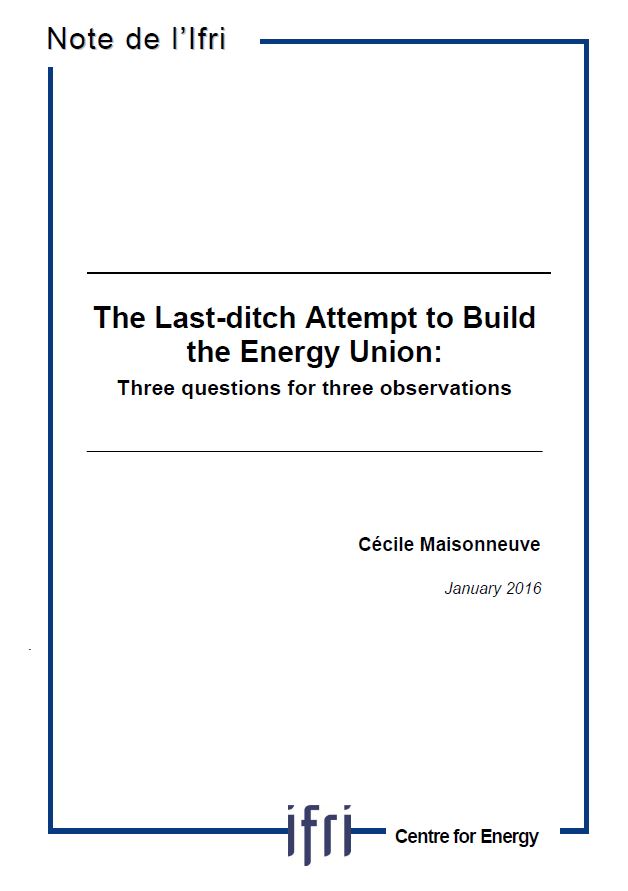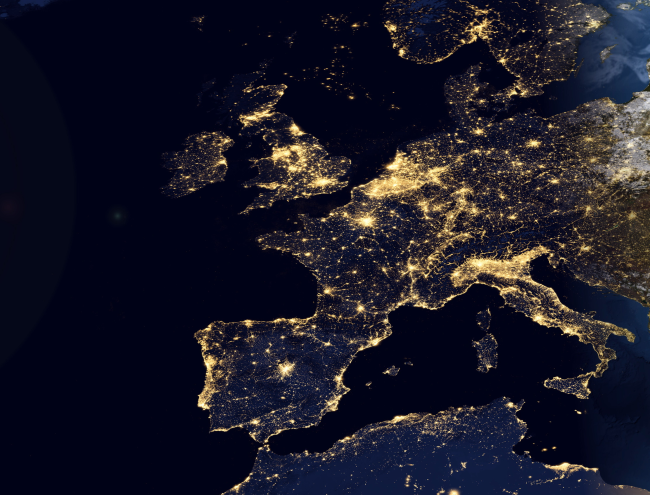The Last-ditch Attempt to Build the Energy Union

Nearly one year after the presentation of the Energy Union project, while 2016 promises to be a critical year for its implementation, what is the status of this flagship project of the Juncker Commission?

Analysis of each of the three dimensions of the Energy Union project – strategic, political and economic – leads to scepticism about the ability to re-establish a climate and energy policy which actually works.
Internationally, the Energy Union in its inception like in its ambitions, is marked by the return of geopolitics. It makes a welcome break from the disconnected and idealistic approach to international realities which characterised the climate and energy policy up to now. However, is it a response commensurate with the ongoing geopolitical upheavals? If the very principle of reconnecting with international realities is achieved, sound diagnosis of the upheavals at work is still missing. In particular, the re-emergence of the United States as the sole global energy power, or even the fundamental changes in the oil and gas markets with the emergence of unconventional hydrocarbons would deserve careful monitoring. The adapting and modelling of the impact of geopolitical developments on Europe is still missing.
Politically, the Juncker Commission's ambition must be welcomed for leaving major ideological debates behind and taking action, while maintaining dialogue and promoting support. The proactive approach and the renewed governance of the climate and energy policy are necessary to counterbalance the centrifugal forces at work which put the very principle of an enhanced European energy policy at risk, because who really wants the Energy Union in a Europe which combines a revival of nationalism and urgent crises, tipping the energy issue between the exclusive preserve of the Member States and an afterthought at the major European summits? Moreover, positions are becoming tense in some Member States who are even rejecting the very principle of energy transition. Finally, new irritants are occurring, such as the Nordstream 2 gas pipeline project, without the fundamental differences in the relationship with Russia having been resolved or the objectives of electricity market reform fulfilled.
The Energy Union is ambitious in its economic component, without clarifying its ability to restore confidence among investors and calmness among consumers. The carbon market reform is not convincing, while that of the electricity market will bring up the great debates between regulation and market, 20 years after the initial directives on liberalising the energy markets in Europe. Yet, while the European Union is struggling with the definition of its market model and risks getting lost in debates, still too often tainted by ideology, big data is advancing in all sectors including energy. Where is the digital revolution in the Energy Union? Who will implement it when the large European utilities are bled dry, and when the American Internet giants are in a position to choose how they will change the sector completely?
Everybody wants the Energy Union, but everyone can define it according to their interests, as it has a variable geometry. This plan will fail if it is only a war machine against Russia. What Europe needs is a pragmatic project. The European Union must find its own shale gas revolution, that is to say a policy which ensures its energy security, strengthens its economy, and which allows it to play an appropriate role against climate change, without reducing its freedom of action in the world, but rather increasing it. Otherwise, the European Energy Union will be in the world what it was at the COP 21: voiceless and paralysed.

Available in:
Regions and themes
Share
Download the full analysis
This page contains only a summary of our work. If you would like to have access to all the information from our research on the subject, you can download the full version in PDF format.
The Last-ditch Attempt to Build the Energy Union
Related centers and programs
Discover our other research centers and programsFind out more
Discover all our analysesBrazil One Year Away from the October 2026 General Elections
Brazil’s general elections will be held on October 4, 2026, to elect the president, vice-president, members of the National Congress, governors, deputy governors and state legislative assemblies. For the presidential and gubernatorial elections, a second round will be held on October 25 if no candidate obtains a majority of the votes in the first round.
COP30: An Inflection Point for Climate Action and Governance
The 30th Conference of the Parties (COP30), opening in Belém, Brazil, on November 10th 2025, convenes at a perilous moment.
The Strategic Dimension of Skills in the Clean Industrial Deal
In the competitiveness and energy transition battles, the European Union (EU) must master a determinant factor: skills.
The Energy Transition Faces Geopolitical Challenges. How Can Ideological Divides Be Overcome?
President Trump’s positions and policies, combined with record coal consumption and booming global electricity demand, geo-economic confrontation, and widespread concerns about energy security, are changing the game when it comes to understanding realistic decarbonization trajectories. The war in Europe is intensifying competition between defense and transition budgets. This is also the case elsewhere in the world.











